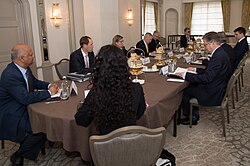Elon Musk, the world’s wealthiest individual and a prominent supporter of Donald Trump’s 2024 presidential campaign, has declared a significant reduction in his political contributions. This decision follows his substantial financial backing of Trump’s re-election bid, which has led to increased scrutiny and backlash affecting Tesla’s market performance.
Speaking at the Qatar Economic Forum, Musk stated he has “done enough” in terms of political donations and currently sees no compelling reason for further spending. He emphasized that future contributions would only occur if circumstances change. This marks a notable shift from his previous role as the largest donor in the 2024 U.S. election cycle, where he contributed over $290 million to support Trump and Republican candidates.
Musk’s political involvement extended beyond financial contributions. He was appointed to lead the Department of Government Efficiency , an initiative aimed at reducing federal spending and bureaucracy. However, his association with the Trump administration and active political engagement have sparked controversy, leading to consumer boycotts and protests against Tesla.
The “Tesla Takedown” movement, a grassroots protest campaign, emerged in early 2025 targeting Tesla and Musk’s political affiliations. Protesters have organized demonstrations at Tesla stores across the United States, Canada, Europe, and Australasia, urging the public to divest from Tesla by selling their vehicles and shares. The movement aims to economically impact Musk and challenge his political influence.
Tesla’s sales have been adversely affected, particularly in Europe. In January 2025, Tesla’s vehicle registrations in Europe dropped to 9,913 units from 18,121 in January 2024, representing a 45% year-over-year decline. This downturn coincides with intensified competition in the electric vehicle market and consumer backlash against Musk’s political activities.
Investors have expressed concerns over Musk’s dual roles as a business leader and political figure. Tesla’s first-quarter income experienced a 71% decline, prompting Musk to consider increasing his stake in the company to maintain management control. He currently owns 12.77% of Tesla and has indicated a desire to raise his stake to 25%.
Musk has also faced criticism for his support of right-wing political parties internationally. He endorsed Alice Weidel of Germany’s Alternative for Germany and backed the Reform UK party in the United Kingdom. These endorsements have further fueled public dissent and impacted Tesla’s brand image.




 Mild COVID-19 Variant Spreads Across Asia
Mild COVID-19 Variant Spreads Across Asia 